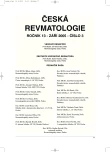Polymorphism of the tumor necrosis factor promoter region in patients with rheumatoid arthritis
Polymorfismus v promotorové oblasti genu pro tumor nekrotizující faktor alfa u pacientů s revmatoidní artritidou
Úvod.
Revmatoidní artritida (RA) je modelem polygenně podmíněného onemocnění, kde genetické faktory mohou ovlivňovat jak vnímavost ke vzniku choroby, tak závažnost jejího průběhu. Tumor nekrotizující faktor alfa (TNF alfa) je pleiotropní prozánětlivý cytokin, který hraje významnou roli v indukci T buněčné imunitní odpovědi, při stimulaci produkce proteolytických enzymů, prostaglandinů, chemokinů, při zvýšené expresi adhezivních molekul či HLA antigenů II. třídy v patogenezi revmatoidní artritidy. Zvýšené koncentrace TNF alfa prokazované v plazmě a synoviální tekutině pacientů s revmatoidní artritidou mohou být asociovány s polymorfismy v genech pro TNF alfa a TNF beta.
Cíl.
Cílem studie bylo prokázat možný vztah mezi polymofismem –308 G/A v promotorové oblasti genu pro TNF alfa a vnímavostí ke vzniku a závažností revmatoidní artritidy.
Metody.
Celkem 100 pacientů, kteří splnili revidovaná diagnostická kritéria American College of Rheumatology (ACR) pro revmatoidní artritidu, s délkou trvání choroby minimálně 2 roky, bylo rozděleno do 4 skupin podle rentgenové progrese (standardní klasifikace dle Steinbrockera: stadium I: nedestruktivní – 10 pacientů, stadium II–IV: destruktivní – 90 pacientů). Kontrolní skupina zahrnovala 150 zdravých dobrovolníků obdobné distribuce věku a pohlaví.
Výsledky.
Nebyl zjištěn rozdíl v genotypových distribucích a frekvencích alel polymorfismu –308 G/A TNF alfa mezi pacienty s revmatoidní artritidou a kontrolní skupinou. Signifikantní rozdíly byly pozorovány v zastoupení genotypů polymorfismu –308 G/A TNF alfa v rámci souboru pacientů s revmatoidní artritidou, a to mezi nedestruktivní (stadium I) a destruktivní formou (stadium II–IV) tohoto onemocnění s vyšším zastoupením GG genotypu u destruktivní formy RA (odds ratio=4,70, P=0,03). Při srovnání nejtěžší destruktivní formy (stadium IV) a nedestruktivní formy (stadium I) bylo patrné signifikantní více než 10násobné riziko vývoje nejtěžšího stupně postižení pro nositele GG genotypu (odds ratio=10,5, P=0,009).
Závěr.
Výsledky naznačují asociaci genotypu GG polymorfismu –308 G/A TNF alfa se závažností průběhu revmatoidní artritidy.
Klíčová slova:
revmatoidní artritida, gen, polymorfismus, TNF alfa
Authors:
P. Němec 1; M. Goldbergová 2; M. Souček 1; D. Polášková 2; A. Vašků 2
Authors‘ workplace:
II. interní klinika, FN u sv. Anny v Brně, 2Ústav patologické fyziologie, Lékařská fakulta MU Brno
1
Published in:
Čes. Revmatol., 13, 2005, No. 3, p. 84-88.
Category:
Original Papers
Overview
Introduction.
Rheumatoid arthritis (RA) is a model of multigenic disorder and genetic factors may be implicated in a susceptibility to disease initiation as well as a severity of disease course. Tumor necrosis factor alpha (TNF alpha) is a pleiotropic pro-inflammatory cytokine implicated in stimulation of T-cell immune response, up-regulation of proteolytic enzymes, prostaglandins, chemokines, over-expression of adhesion or HLA class II molecules. Elevated levels of TNF-alpha in plasma and synovial fluid from patients with rheumatoid arthritis may be associated with gene polymorphisms of TNF alpha and TNF beta.
Aim.
The aim of this study was to elucidate putative association between -308 G/A polymorphism of TNF-alpha promotor region and its susceptibility to disease onset and severity of rheumatoid arthritis.
Methods.
All 100 patients that fulfilled revised criteria of American College of Rheumatology (ACR) for rheumatoid arthritis, with disease duration of 2 years minimum, were divided in 4 subgroups according the radiographic progression (typical classification according to Steinbrocker: stage I: non-destructive – 10 patients, stage II-IV. destructive form – 90 patients). Control group was characterized with similar age and sex distribution.
Results.
No difference of genotype distribution and frequency of allelic polymorphism of -308 G/A TNF alpha have been found between patients with rheumatoid arthritis and control groups. Significant differences have been observed in genotype polymorphism -308 G/A TNF-alpha between the subgroups of rheumatoid arthritis patients. Patients with destructive form of RA (stage II-IV) revealed increased amount of GG genotype (odds ratio=4.70, P=0.03). When most destructive form (stage IV) and non-destructive form (stage I) were compared, more than 10 times higher risk of the most severe joint affection for patients with GG genotype (odds ratio=10.5, P=0.009) was observed.
Conclusion.
These results show association of GG polymorphism of –308 G/A TNF-alpha with more severe course of rheumatoid arthritis.
Key words:
Rheumatoid arthritis, gene, polymorphism, TNF-alpha
Labels
Dermatology & STDs Paediatric rheumatology RheumatologyArticle was published in
Czech Rheumatology

2005 Issue 3
-
All articles in this issue
- Antibodies against cyclic citrullinated peptide (anti-CCP) in serum and synovial fluid from patients with rheumatoid arthritis and osteoarthritis
- Polymorphism of the tumor necrosis factor promoter region in patients with rheumatoid arthritis
- Dysimmune myopathies (idiopathic inflammatory myopathies)
- Standard recommendations for the management of psoriatic arthritis
- Association of rheumatoid arthritis and Castleman’s disease
- Cryoglobulinemic vasculitis in a patient with chronic hepatitis C infection
- Czech Rheumatology
- Journal archive
- Current issue
- About the journal
Most read in this issue
- Antibodies against cyclic citrullinated peptide (anti-CCP) in serum and synovial fluid from patients with rheumatoid arthritis and osteoarthritis
- Cryoglobulinemic vasculitis in a patient with chronic hepatitis C infection
- Dysimmune myopathies (idiopathic inflammatory myopathies)
- Association of rheumatoid arthritis and Castleman’s disease
